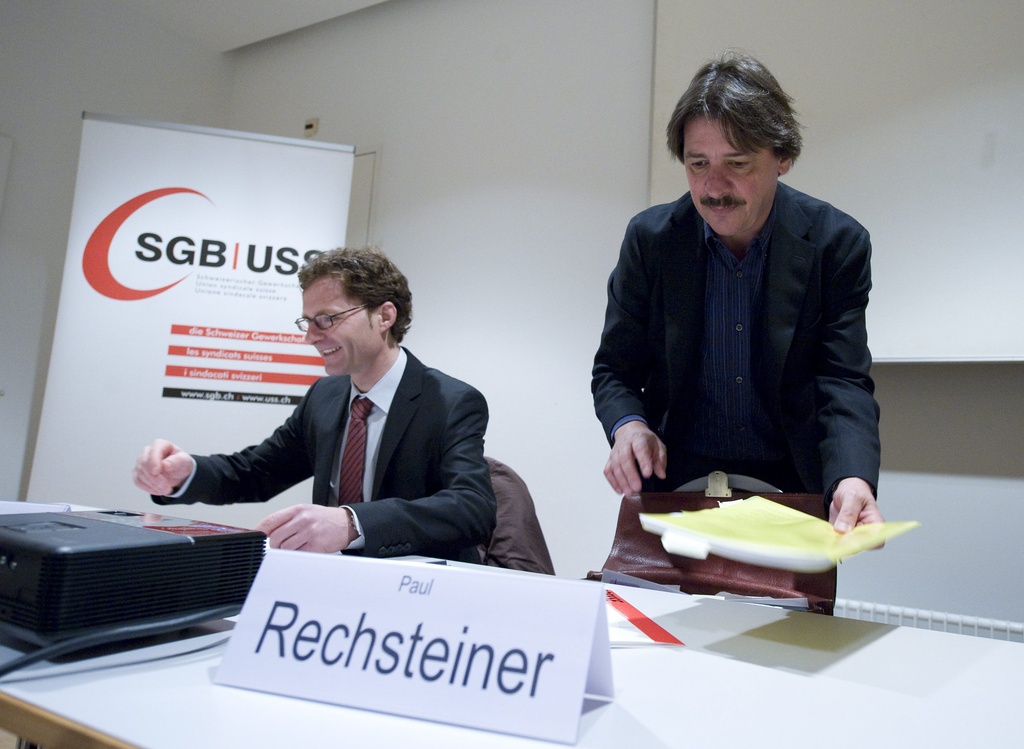Wage calculators help fight for transparency

The issue of fair pay has been at the centre of discussions in Switzerland for some time. But employers are opposed to demands by the political left, trade unions and scientists for salary transparency.
It is an unspoken rule in Swiss society: questions about individual salaries are taboo. Don’t even think about asking your neighbours how much they take home at the end of the month.
But at the same time, the excessive salaries of top managers, underpaid low-skilled labour, equal pay for women and men, and the introduction of minimum wages have been high on the political agenda.
Both Roman Graf of the Employment Observatory at Geneva University and Ruth Derrer Balladore, a leading member of the Swiss Employers Association, agree: salaries are considered a strictly personal matter. They are part of the private sphere.
“It does not mean that you cannot bring it up at work, but unlike in the United States, for instance, there is no such tradition in Switzerland,” says Derrer Balladore.
“Nevertheless, even if it is not the only element, salary transparency is key to identifying cases of discrimination,” adds Graf.
His opinion, though, is rejected by the employers, who argue it could be damaging to the working climate.
The label is a certification of equal compensation for women and men.
Created in 2005, it cooperates with the Employment Observatory at Geneva University and is supported financially by the Federal Office for Gender Equality.
It is aimed at promoting salary equality within companies and organisations.
To date, 11 companies and organisations have been certified with the equal salary label, valid for three years.
The promoters hope to win ten additional companies by the end of 2013, according to Véronique Goy Veenhuys, director and founder of the certification scheme.
Clear rules
Salary transparency is by no means tantamount to publishing how much every individual employee is earning.
“It would also be a success if most of the private companies had a transparent salary system, including clear rules against gender discrimination and on hierarchical positions,” says Graf.
Derrer Balladore, for her part, does not accept his criticism. She says most companies already have a system of work classification.
“But it is crucial that every firm is free to choose the system that is best suited for the specific demands of the company.”
Imposing the same salary transparency regulations on every company would be a mistake, according to Derrer Balladore.
Parliament last month discussed a proposal by a Social Democratic parliamentarian for more transparency. But the motion was voted down by the House of Representatives.
The proposal called for the mandatory publication of the rules governing salary levels within a company in an effort to help women, who are still victims of gender-based salary discrimination.
The defeat in parliament has not stopped the women’s chapter of the party from launching an initiative aimed at promoting equal pay between men and women.

More
Earnings: a public or a private affair?
Online wage calculator
Salary transparency is also an issue for the application of a labour accord between Switzerland and the European Union. Companies active in Switzerland are bound by the agreement to pay their employees coming from the 27-nation bloc a standard salary.
Amid an ongoing controversy over companies allegedly undercutting standard wages, the Swiss Trade Union Federation commissioned an interactive computer application from the Employment Observatory of Geneva University.
The online salary calculator, launched eight years ago, tries to determine the average salary for specific types of skilled labour in about 70 economic branches in the private sector, broken down into separate regions in Switzerland.
The calculator has about 70,000 hits a day according to Graf. More than 1,000 sites in Switzerland and abroad have a direct link to the Trade Union service.
It serves two purposes: employees can compare their own salary with others offered on the market. It also allows employers to check their competitive edge when it comes to pay systems.
The trade union calculator prompted similar services at a cantonal level, all developed by Employment Observatory. They also attracted attention from abroad, notably from the authorities in the Austrian capital, Vienna.
The federal authorities, employers and trade unions jointly launched a project in 2009 aimed at promoting fair salaries for women.
It allows companies to test whether their salary systems are gender neutral. If they fail to meet the criteria they have four years to improve their salary policy.
However, only 33 companies are taking part in the voluntary scheme. The promoters hoped to convince at least 100 firms and organisations by March 2014.
The interior ministry recently ruled out introducing mandatory measures to promote equal pay.
Culture change
It seems evident that the calculators and other similar tools have helped boost salary transparency over the past few years.
“But we are still far away from the Anglo-Saxon culture,” Graf cautions.
He believes the increasingly mobile labour market and the globalised economy will have an impact on Switzerland’s traditional salary secrecy.
The influx of managers and personnel from the US and Britain, as well as Swiss expatriates returning to their country after a stint in the Anglo-Saxon world, could both contribute to culture change in Switzerland.
However, salary secrecy will only come to an end in Switzerland if employers understand that more transparency works in their favour, reducing the risk of discriminatory pay, according to Graf.
(Adapted from Italian by Urs Geiser)

In compliance with the JTI standards
More: SWI swissinfo.ch certified by the Journalism Trust Initiative




You can find an overview of ongoing debates with our journalists here. Please join us!
If you want to start a conversation about a topic raised in this article or want to report factual errors, email us at english@swissinfo.ch.